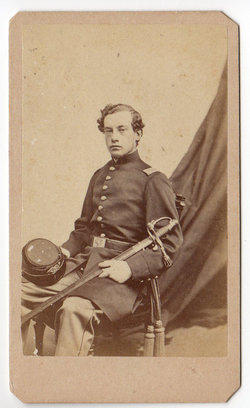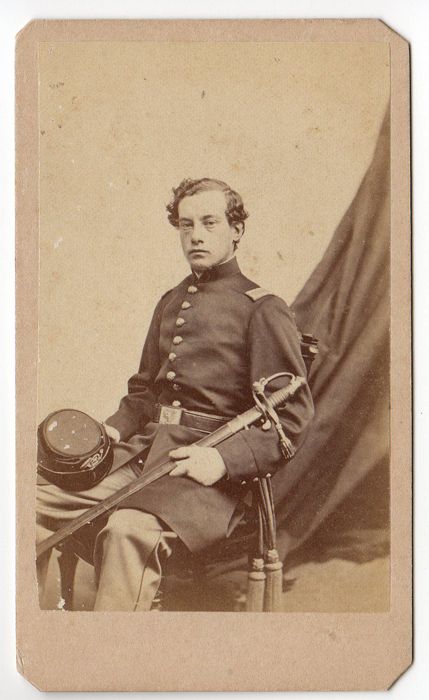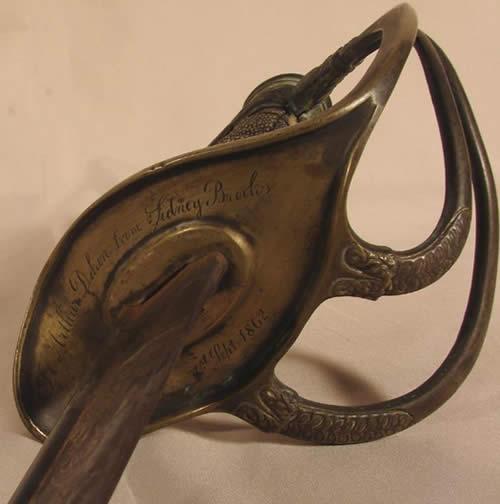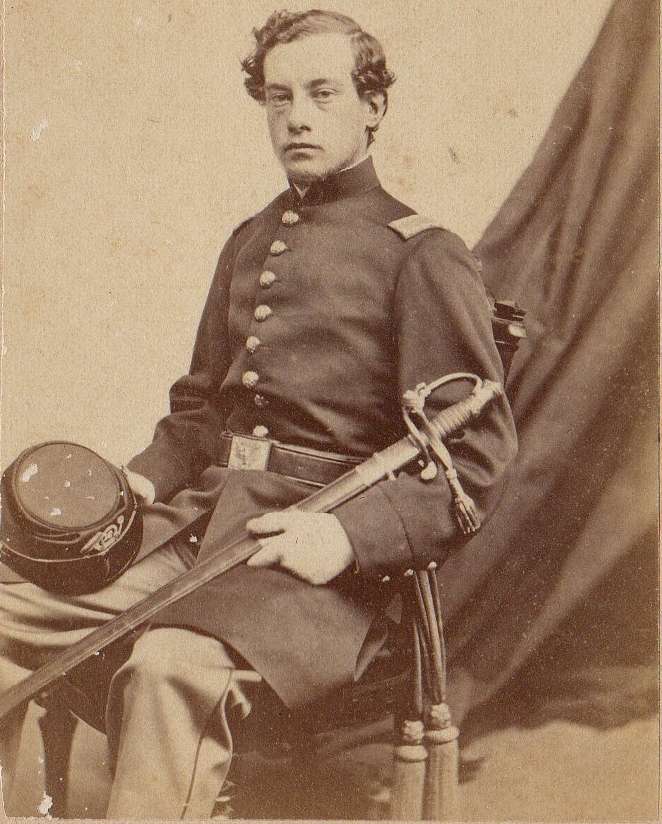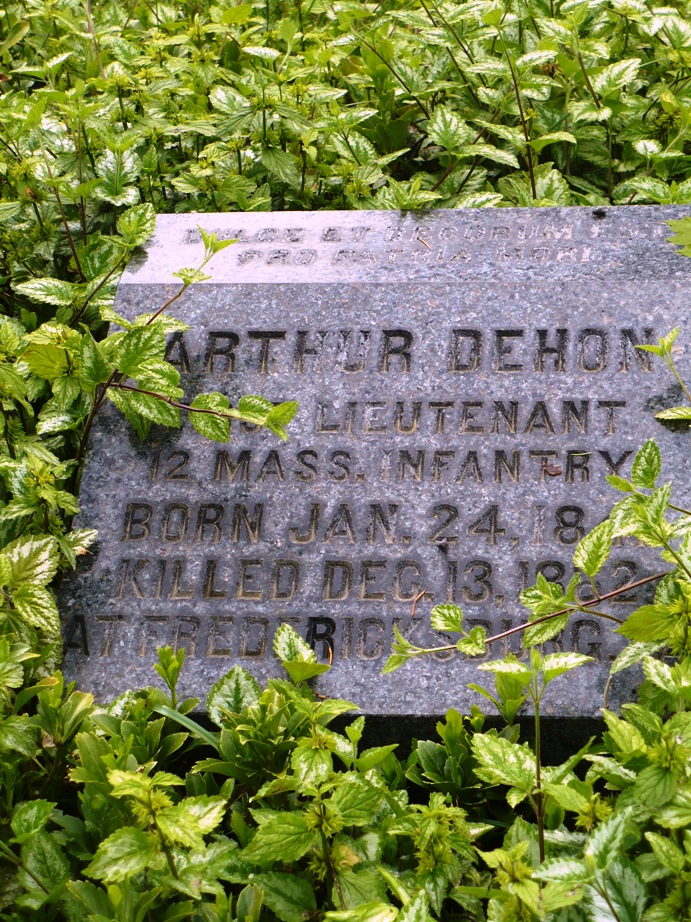Arthur's father was born in Boston, Suffolk County, Massachusetts, 2/2/1814. He married Caroline Inches and had 3 children, Arthur, Caroline Inches Dehon and Henderson Inches Dehon. William passed away on 5/22/1875 in Boston.
Arthur's mother Caroline was also born in Massachusetts, in 1816 to Henderson Inches (1774-1857) and Susan Brimmer (1782-1823).
Arthur's sister Caroline was born in Boston, Suffolk County, Massachusetts, in 1843. She married Adams Sherman Hill and had a child. She was acquainted with the great jurist Oliver Wendell Holmes, Jr., and corresponded with him during the Civil War. It is Holmes who reported Arthur died as a result of being shot through the heart. She passed away in 1914 in Boston.
Arthur's brother Henderson, was born at Cambridge, Middlesex County, Massachusetts, on 2/18/1847 and died of an illness in 1867.
Arthur was an 1861 graduate at Harvard.
According to the "Regimental history from Massachusetts Soldiers, Sailors, and Marines in the Civil War", Arthur was a member of the 12th Massachusetts Volunteer Infantry. The book goes on to say the the unit "... was recruited in the latter part of April, 1861, through the personal efforts of Fletcher Webster, son of the statesman, Daniel Webster. During the first week in May, 1861, the regiment was transferred to Fort Warren, where its organization was completed. Five companies were raised in Boston and one each in Abington, North Bridgewater, Gloucester, Stoughton, and Weymouth. On June 26, Col. Webster and a large majority of the officers and men of the regiment were mustered into the service. The regiment left Fort Warren for the seat of war on July 23, and on the 27th it reached Sandy Hook, Md., near Harper's Ferry. The summer and fall of 1861 were spent in guarding the line of the upper Potomac near Darnestown, Serteca Creek, Muddy Branch, and other points between Washington, D. C., and Frederick, Md. Early in December, with the rest of Abercrombie's Brigade, it went into winter quarters at Camp Hicks on the Baltimore pike about four miles east of Frederick. In the latter part of February the regiment was sent into the Shenandoah Valley, Gen. N. P. Banks being in command of that district. As a part of Abercrombie's Brigade, Williams' Division, Banks' (5th) Corps, it was occupied during the spring and early summer reconnoitering in the neighborhood of Winchester, Aldie, Front Royal, Manassas, and other places. In May, 1862, it formed a part of Hartsuff's Brigade, Ricketts' Division, McDowell's (3d) Corps, Army of Virginia. With Ricketts' Division it reached the battlefield of Cedar Mountain, August 9, 1862, just at the close of the action and suffered several casualties by artillery fire. At Second Bull Run, August 30, General Z. B. Tower being in command of the brigade in the absence of Gen. Hartsuff who was ill, the 12th Regt. Was heavily engaged near Bald Hill on the Chinn farm, losing its commander, Col. Webster, and 25 officers and men killed or mortally wounded. The reorganization of the army in early September, 1862, made Ricketts' Division a part of Hooker's (1st) Corps, and as a part of Hartsuff's Brigade the 12th Regt. joined in the operations which forced the Confederates out of Frederick, Md., and on toward South Mountain. The 12th was engaged in the battle of South Mountain, Sept. 14, suffering only slight loss. On the 17th, at Antietam, it fought in the Bloody Cornfield, losing 224 officers and men, of whom 74, including Major Elisha Burbank and Assistant Surgeon A. A. Kendall, were killed or mortally wounded. Here it came into conflict with the famous Texas Brigade and captured the colors of the 1st Texas Infantry. At Fredericksburg, Dec. 13, 1862, under command of Col. James L. Bates, as a part of Lyle's Brigade, Gibbon's Division, Reynolds' (1st) Corps, it participated in the attack on the Confederate right, losing heavily. Among the killed was First Lieutenant Arthur Dehon, who was serving on Gen. Meade's
staff...".
Arthur served as the aide-de-camp to General George Gordon Meade. According to the book entitled "Harvard's Civil War", General Meade, wrote his wife the following after Arthur's death: "I have become very much attached to Dehon...it does seem as if good luck that attends me is to be made in the misfortunes of my staff."
General Meade wrote of Arthur in a report to Third Division Headquarters, "The Third Brigade had not advanced over 100 yards, when the battery on the height on its left was re-manned, and poured a destructive fire into its ranks. Perceiving this, I dispatched my aide-de-camp, Lieutenant Dehon, with orders for General Jackson (Conrad Feger Jackson)to move by the right flank till he could clear the open ground in front of the battery, and then, ascending the height through the woods, swing around to the left and take the battery. Unfortunately Lieutenant Dehon fell with a ball to his heart just as he reached General Jackson, and a short time afterward the latter officer was killed. The regiments, however, did partially execute the movement to the right oblique, and advancing across the railroad, a portion ascending the heights in their front. The loss of their commander, and the severity of the fire from both artillery and infantry to which they were subjected, compelled them to withdraw, when those on their right withdrew.... The loss of Lieutenant Arthur Dehon, Twelfth Massachusetts, my aide, is greatly to the deplored, as he was a young officer of high promise, endeared to all who knew him for his manly virtues and amiable character."
The volley of bullets that were fired at Arthur also killed General Jackson with a round through his skull. General Jackson's aid, Captain T. Brent Swearingen, was by his side but faired better as he only had his horse shot out from under him during the fusillade of bullets that rained down upon them.
At his death, Arthur Dehon was 21 ears old.
Arthur's father was born in Boston, Suffolk County, Massachusetts, 2/2/1814. He married Caroline Inches and had 3 children, Arthur, Caroline Inches Dehon and Henderson Inches Dehon. William passed away on 5/22/1875 in Boston.
Arthur's mother Caroline was also born in Massachusetts, in 1816 to Henderson Inches (1774-1857) and Susan Brimmer (1782-1823).
Arthur's sister Caroline was born in Boston, Suffolk County, Massachusetts, in 1843. She married Adams Sherman Hill and had a child. She was acquainted with the great jurist Oliver Wendell Holmes, Jr., and corresponded with him during the Civil War. It is Holmes who reported Arthur died as a result of being shot through the heart. She passed away in 1914 in Boston.
Arthur's brother Henderson, was born at Cambridge, Middlesex County, Massachusetts, on 2/18/1847 and died of an illness in 1867.
Arthur was an 1861 graduate at Harvard.
According to the "Regimental history from Massachusetts Soldiers, Sailors, and Marines in the Civil War", Arthur was a member of the 12th Massachusetts Volunteer Infantry. The book goes on to say the the unit "... was recruited in the latter part of April, 1861, through the personal efforts of Fletcher Webster, son of the statesman, Daniel Webster. During the first week in May, 1861, the regiment was transferred to Fort Warren, where its organization was completed. Five companies were raised in Boston and one each in Abington, North Bridgewater, Gloucester, Stoughton, and Weymouth. On June 26, Col. Webster and a large majority of the officers and men of the regiment were mustered into the service. The regiment left Fort Warren for the seat of war on July 23, and on the 27th it reached Sandy Hook, Md., near Harper's Ferry. The summer and fall of 1861 were spent in guarding the line of the upper Potomac near Darnestown, Serteca Creek, Muddy Branch, and other points between Washington, D. C., and Frederick, Md. Early in December, with the rest of Abercrombie's Brigade, it went into winter quarters at Camp Hicks on the Baltimore pike about four miles east of Frederick. In the latter part of February the regiment was sent into the Shenandoah Valley, Gen. N. P. Banks being in command of that district. As a part of Abercrombie's Brigade, Williams' Division, Banks' (5th) Corps, it was occupied during the spring and early summer reconnoitering in the neighborhood of Winchester, Aldie, Front Royal, Manassas, and other places. In May, 1862, it formed a part of Hartsuff's Brigade, Ricketts' Division, McDowell's (3d) Corps, Army of Virginia. With Ricketts' Division it reached the battlefield of Cedar Mountain, August 9, 1862, just at the close of the action and suffered several casualties by artillery fire. At Second Bull Run, August 30, General Z. B. Tower being in command of the brigade in the absence of Gen. Hartsuff who was ill, the 12th Regt. Was heavily engaged near Bald Hill on the Chinn farm, losing its commander, Col. Webster, and 25 officers and men killed or mortally wounded. The reorganization of the army in early September, 1862, made Ricketts' Division a part of Hooker's (1st) Corps, and as a part of Hartsuff's Brigade the 12th Regt. joined in the operations which forced the Confederates out of Frederick, Md., and on toward South Mountain. The 12th was engaged in the battle of South Mountain, Sept. 14, suffering only slight loss. On the 17th, at Antietam, it fought in the Bloody Cornfield, losing 224 officers and men, of whom 74, including Major Elisha Burbank and Assistant Surgeon A. A. Kendall, were killed or mortally wounded. Here it came into conflict with the famous Texas Brigade and captured the colors of the 1st Texas Infantry. At Fredericksburg, Dec. 13, 1862, under command of Col. James L. Bates, as a part of Lyle's Brigade, Gibbon's Division, Reynolds' (1st) Corps, it participated in the attack on the Confederate right, losing heavily. Among the killed was First Lieutenant Arthur Dehon, who was serving on Gen. Meade's
staff...".
Arthur served as the aide-de-camp to General George Gordon Meade. According to the book entitled "Harvard's Civil War", General Meade, wrote his wife the following after Arthur's death: "I have become very much attached to Dehon...it does seem as if good luck that attends me is to be made in the misfortunes of my staff."
General Meade wrote of Arthur in a report to Third Division Headquarters, "The Third Brigade had not advanced over 100 yards, when the battery on the height on its left was re-manned, and poured a destructive fire into its ranks. Perceiving this, I dispatched my aide-de-camp, Lieutenant Dehon, with orders for General Jackson (Conrad Feger Jackson)to move by the right flank till he could clear the open ground in front of the battery, and then, ascending the height through the woods, swing around to the left and take the battery. Unfortunately Lieutenant Dehon fell with a ball to his heart just as he reached General Jackson, and a short time afterward the latter officer was killed. The regiments, however, did partially execute the movement to the right oblique, and advancing across the railroad, a portion ascending the heights in their front. The loss of their commander, and the severity of the fire from both artillery and infantry to which they were subjected, compelled them to withdraw, when those on their right withdrew.... The loss of Lieutenant Arthur Dehon, Twelfth Massachusetts, my aide, is greatly to the deplored, as he was a young officer of high promise, endeared to all who knew him for his manly virtues and amiable character."
The volley of bullets that were fired at Arthur also killed General Jackson with a round through his skull. General Jackson's aid, Captain T. Brent Swearingen, was by his side but faired better as he only had his horse shot out from under him during the fusillade of bullets that rained down upon them.
At his death, Arthur Dehon was 21 ears old.
Inscription
On the top of his gravestone is the Latin phrase. "Dulce et decorum est pro patria mori". It is a line from the Roman lyrical poet Horace's Odes (III.2.13). It basically means "It is sweet and fitting to die for one's country." This phrase can be seen at the front entrance to the Arlington Memorial Amphitheater at the Arlington National Cemetery and at the second monument of the Point Lookout Confederate Cemetery in Point Lookout, Maryland. It is also found at the Confederate Cemetery in the Manassas National Battlefield Park which is interesting as that was one of the famous battles in which Lt. Dehon fought in.
Gravesite Details
Interred 12/22/1862
Family Members
Advertisement
Advertisement
